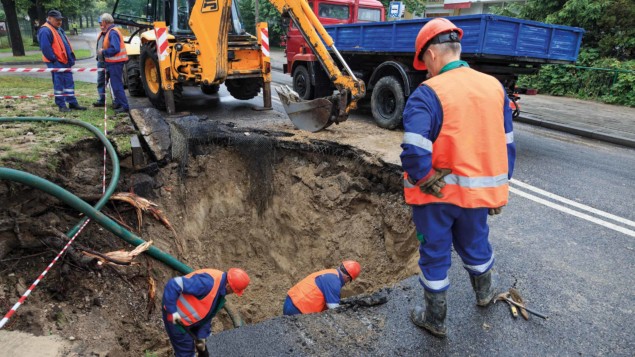With a new era of quantum technology beckoning, James McKenzie examines the opportunities it offers for business and industry

It’s an exciting time for quantum technology. There are big programmes in the US, the EU and China, and the UK is at the forefront of the field. The UK government launched the National Quantum Technologies Programme in 2013 with a further £315m committed in the last budget to support development and commercialization in this area.
That’s all great, but what’s the motivation? After all, if you’re not familiar with quantum technology, ploughing such big sums of money into the field seems a leap of faith. I’m reminded of the immortal line from the movie Life of Brian, “What have the Romans ever done for us?”. The characters then provide a long list of the Romans’ practical achievements, such as aqueducts, education and sanitation, forcing them to concede that, well, yes, the Romans did a lot.
In a similar vein, the US physicist Chad Orzel once asked in an article in Forbes: “What has quantum mechanics ever done for us?” Now I’m sure Physics World readers don’t need to read his piece to find the answer. The entire telecoms industry is built around lasers and amplifier technology, which are quantum devices, even if the fibres themselves are largely classical. The key physics of the laser was, after all, contained in Albert Einstein’s famous 1917 paper, in which he introduced the idea of stimulated emission.
It’s all quantum
Quantum physics also underpins modern computers, which could not function without our understanding of semiconductors, band structures and doping. And thanks to NAND Flash memory – so named because it’s like a NOT-AND logic gate – we are blessed with “non-volatile” solid-state storage systems. So every time we turn off our mobile phones, USB sticks, memory drives or data centres, all the stored data doesn’t get wiped. Quantum mechanics delivers again.
NAND Flash memory is one of the largest segments of the global semiconductor industry, with annual sales of tens of billions of dollars. Indeed, NAND Flash fabrication plants cost several billions of dollars to build. And every time you write data onto NAND Flash, you’re using one of the most surprising and successful predictions of quantum mechanics. I’m referring to barrier penetration, or tunnelling, which allows a low-energy particle to penetrate a high potential-energy barrier.
Other applications of quantum physics include magnetic-resonance imaging, atomic clocks and satellite navigation. But the future looks still more intriguing. With further advances in computing, sensing, imaging and communications, quantum technologies will bring promising new approaches to solving global problems such as disease and climate change.
One burgeoning area is quantum computing and security, which will let us keep networks secure thanks to advanced algorithms as well as quantum keys in the form of entangled photons sent down fibres. The work will let us know if an unauthorized person has looked at the key – vitally important for secure communications.
The technology underpinning quantum cryptography has already been crammed into a satellite – so a chip on a phone won’t be too far off. Banks are going to love this stuff as an ultra-secure way of sending money. On the down side though, there’s the prospect of a “crypto apocalypse” (see “The quantum Y2K moment”).
The problem is that quantum computers, which work on very different principles to conventional computers, could quickly crack any of today’s common security systems like 128 bit AES encryption (a brute force attack would take millions of years even with the best supercomputers available today). According to the US National Institute of Standards and Technology, quantum computers will be able to crack the existing public-key infrastructure by 2029 using qubits rather than bits.
Sense of achievement
Quantum technology applied to sensing and imaging is likely to yield some amazing opportunities too. Super-accurate sensors that can map the local gravitational field far below the ground will let us discover new material resources or even just pinpoint buried pipes so that road workers dig holes in the right place. These sensors are already being trialled and, although they currently have to be transported in trucks or trains, researchers are developing smaller, more portable versions.
Chip-based atomic clocks look within reach too. Smaller, cheaper and more portable than conventional atomic clocks, they will be a key enabling technology for the position and navigation of satellite coverage. Atomic-clock time “stamping” of financial transactions will also improve the integrity of markets and our data networks.
As for quantum sensing, it has some spooky abilities. Examples include quantum radar, which has already been demonstrated using entangled photons sent over a few metres. Extending it to microwave photons could perhaps let us observe things locally and know instantly what is happening tens of kilometres away. Quantum cameras, which could create videos at a trillion frames per second, have already been used to track people behind obstacles up to 100 m from an observer.

Mapping the commercial landscape for quantum technologies
In medicine, quantum imaging should let us non-invasively image the brain and study its electrical activity to get a better understanding of how it works, which could help to tackle conditions like Alzheimer’s and dementia.
The bottom line is that while it’s hard to predict the specific business applications and impact on society of quantum technology – just as it was when the laser, transistor and tunnelling were discovered – it’s clear that they will be huge. That’s why quantum technology is so important and why, in funding it so well, governments around the world have made a very smart choice.



